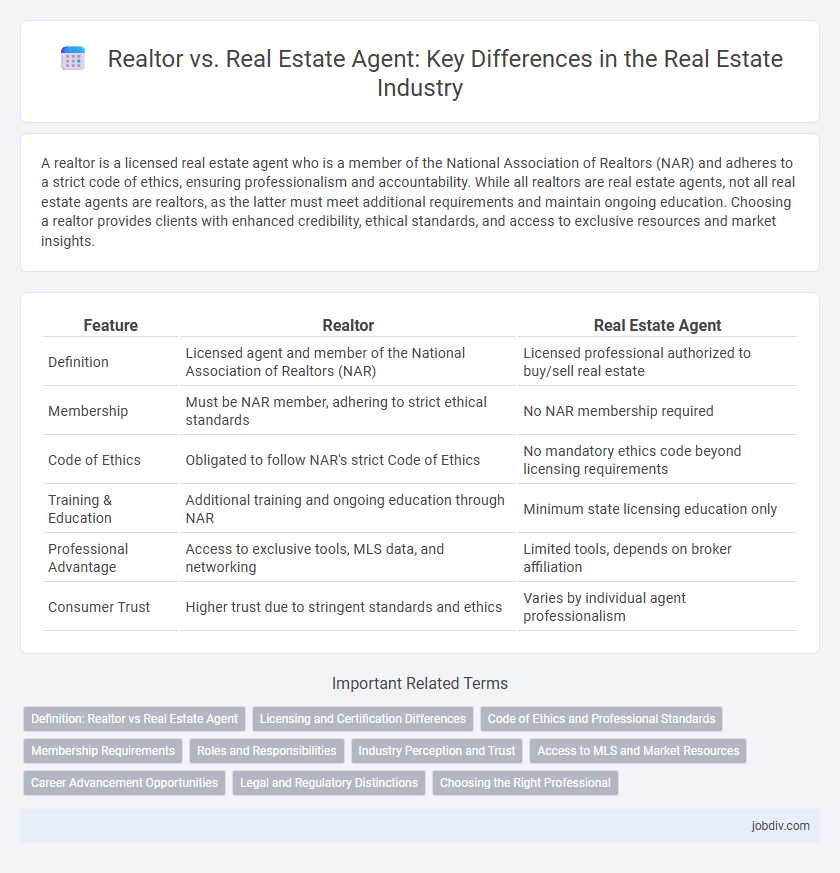A realtor is a licensed real estate agent who is a member of the National Association of Realtors (NAR) and adheres to a strict code of ethics, ensuring professionalism and accountability. While all realtors are real estate agents, not all real estate agents are realtors, as the latter must meet additional requirements and maintain ongoing education. Choosing a realtor provides clients with enhanced credibility, ethical standards, and access to exclusive resources and market insights.
Table of Comparison
| Feature | Realtor | Real Estate Agent |
|---|---|---|
| Definition | Licensed agent and member of the National Association of Realtors (NAR) | Licensed professional authorized to buy/sell real estate |
| Membership | Must be NAR member, adhering to strict ethical standards | No NAR membership required |
| Code of Ethics | Obligated to follow NAR's strict Code of Ethics | No mandatory ethics code beyond licensing requirements |
| Training & Education | Additional training and ongoing education through NAR | Minimum state licensing education only |
| Professional Advantage | Access to exclusive tools, MLS data, and networking | Limited tools, depends on broker affiliation |
| Consumer Trust | Higher trust due to stringent standards and ethics | Varies by individual agent professionalism |
Definition: Realtor vs Real Estate Agent
A Realtor is a licensed real estate professional who is a member of the National Association of Realtors (NAR), adhering to a strict code of ethics and standards. A Real Estate Agent is a licensed individual authorized to facilitate property transactions but may not belong to the NAR or follow its ethical guidelines. The distinction lies primarily in the Realtor's commitment to ethical practices and access to exclusive resources provided by the NAR.
Licensing and Certification Differences
Realtors are licensed real estate agents who are members of the National Association of Realtors (NAR) and must adhere to a strict code of ethics, while real estate agents simply hold state licenses to facilitate property transactions. Licensing requirements for both include passing state exams, but Realtors pursue additional certifications and training to maintain professional standards. This distinction ensures Realtors provide a higher level of accountability and expertise compared to licensed real estate agents.
Code of Ethics and Professional Standards
Realtors adhere to a strict Code of Ethics established by the National Association of Realtors (NAR), ensuring higher professional standards and accountability compared to real estate agents. While all real estate agents must be licensed, only Realtors commit to ongoing education and ethical practices that prioritize clients' interests and transparency. This distinction provides consumers with added confidence in ethical conduct and professional integrity during real estate transactions.
Membership Requirements
Realtors must be licensed real estate agents who are members of the National Association of Realtors (NAR), adhering to a strict code of ethics and continuing education requirements. Real estate agents may not belong to NAR and have fewer obligations regarding ethical standards or professional development. Membership in NAR grants Realtors access to exclusive tools, market data, and networking opportunities that non-member agents typically lack.
Roles and Responsibilities
A Realtor is a licensed real estate agent who is a member of the National Association of Realtors (NAR) and adheres to a strict code of ethics, ensuring higher professional standards. Real estate agents assist clients in buying, selling, and renting properties, handling negotiations, market analysis, and property showings. Realtors often have access to more resources and provide additional services such as dispute resolution and professional development compared to standard real estate agents.
Industry Perception and Trust
Realtors are members of the National Association of Realtors (NAR), adhering to a strict code of ethics, which enhances their credibility and trustworthiness in the real estate industry. Real estate agents, while licensed to facilitate property transactions, may not have the same ethical obligations or commitment to ongoing education, affecting industry perception. This distinction often leads consumers to view Realtors as more reliable professionals who prioritize integrity and client interests.
Access to MLS and Market Resources
Realtors have exclusive access to the Multiple Listing Service (MLS), providing real-time, comprehensive property data and market analysis tools that enhance client opportunities. Real estate agents may access MLS through brokerages but lack the Realtor Association's verified standard and resources supporting ethical practices and networking. Access to MLS and affiliated market resources allows Realtors to offer more accurate listings, competitive pricing, and strategic marketing advantages in property transactions.
Career Advancement Opportunities
Realtors have access to exclusive professional development programs and certifications through the National Association of Realtors, enhancing their credibility and career growth potential. Real estate agents can advance by gaining experience and obtaining licenses but may lack the specialized training and networking opportunities Realtors receive. This distinction often leads to better client trust and higher earning potential for Realtors in competitive markets.
Legal and Regulatory Distinctions
A Realtor is a licensed real estate agent who is a member of the National Association of Realtors (NAR) and adheres to a strict Code of Ethics, distinguishing them legally and ethically from licensed real estate agents who may not have such affiliations. Real estate agents are legally authorized to assist clients in buying, selling, or renting properties under state licensing laws, but only Realtors have access to specific resources, training, and community standards enforced by NAR. The distinction impacts regulatory responsibilities and consumer trust, as Realtors commit to higher ethical standards and ongoing professional development beyond state licensing requirements.
Choosing the Right Professional
Selecting the right professional between a Realtor and a real estate agent hinges on understanding their credentials and affiliations; Realtors are licensed agents who are members of the National Association of Realtors (NAR) and adhere to a strict code of ethics. Real estate agents can perform similar functions but may not have the additional ethical commitment or access to NAR resources that Realtors possess. Evaluating experience, local market knowledge, and professional standards is essential for making an informed choice in property transactions.
Realtor vs Real Estate Agent Infographic

 jobdiv.com
jobdiv.com